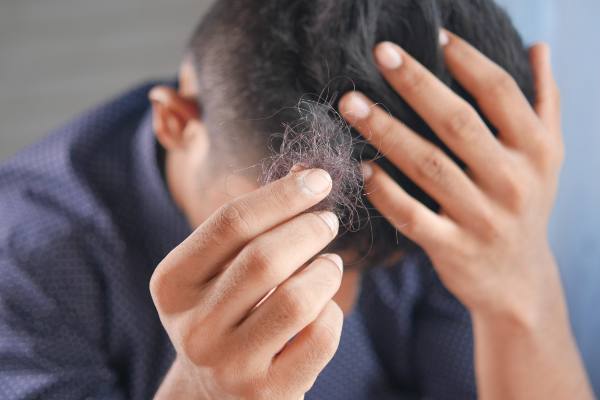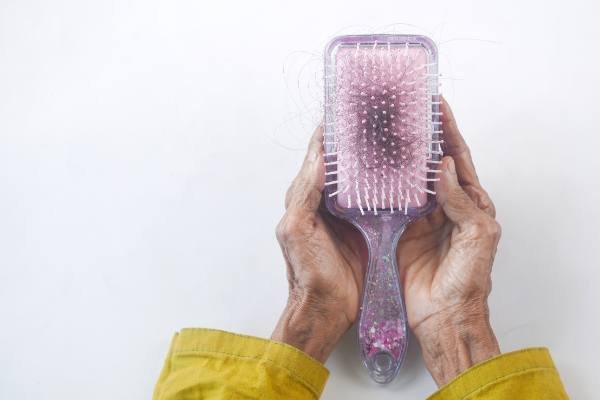Rheumatoid arthritis medications can result in hair loss in some patients. But why do autoimmune disorders like rheumatoid arthritis and hair loss go hand in hand?
Hair loss and rheumatoid arthritis can coexist for a variety of reasons. But rheumatoid arthritis rarely directly contributes to hair loss; instead, stress, certain medications, and other coexisting conditions are common contributors.
Hair Loss
If you notice hair strands in places you normally wouldn’t, you may be experiencing unusual hair loss.
Do you ever find hair on your pillow when you first wake up? Everybody sheds hair while brushing and combing their hair or while taking a shower.
When you start noticing hair loss in places where it shouldn’t be occurring or hair loss patterns like patches, this is when you should be concerned.
Take a look at your hair loss to see if it is greater than usual (you can monitor your hair growth by taking pictures).
Asking your doctor about something is worthwhile if what you are going through is noticeably out of the ordinary. True patches of hair loss or rashes on the scalp along with hair loss are frequently indicators of more serious hair loss.
Does RA Cause Hair Loss
Hair loss is a sign of RA in some people with the condition. Others may experience hair loss as a side effect of their treatment for RA. However, neither of these conditions frequently causes hair loss.
When hair loss does occur, most people typically only lose a small amount of hair. Patches of hair loss are less likely to occur than the hair appearing thin in some areas.
However, those who have hereditary pattern baldness may discover that certain RA medications cause or hasten this type of hair loss.
Males may consequently suffer from permanent hair loss along the hairline or on top of the head. In females, the top and front of the scalp may permanently lose hair.

Methotrexate
As a disease-modifying antirheumatic drug (DMARD), methotrexate is frequently prescribed by doctors for RA. The antirheumatic medication for rheumatoid arthritis that is most frequently recommended is methotrexate, but it can result in hair loss in 1 to 3% of patients.
Methotrexate prevents the growth of inflammatory cells, which theoretically prevents the formation of hair follicles during the growth phase of hair.
When hair follicles are damaged, the regular cycle of hair growth is finally disrupted, which ultimately leads to hair loss.
Additionally, methotrexate depletes the body’s supply of folate, a B complex vitamin that promotes healthy hair.
Most of the time, this side effect is only temporary, and your hair will grow back once you adjust your dosage or stop taking it.
However, the medication occasionally causes you to become exposed, which results in permanent hair loss. In order to learn more about this treatment’s side effects, you should speak with your physician or rheumatologist right away.
You should consult dermatology professionals for a direct evaluation, a precise analysis from which appropriate treatments are accessible, and you should never attempt to self-treat if hair loss is making you feel bothered and stressed.
If your doctor hasn’t given you the go-ahead, stop taking the medication because it very well could be hurting your health.
Leflunomide
Many people combine leflunomide with methotrexate or use it instead of it as another disease-modifying antirheumatic drug (DMARD). This particular type of rheumatoid arthritis medication causes hair loss in about 10% of users.
Biologic Medications
A collection of genetically developed drugs derived from living cells is known as biological medication. The components of the immune response that cause irritation are the explicit focus of this treatment.
Two classes of biological medications that can result in hair loss are etanercept and adalimumab.
Scientists are baffled as to why. Some have suggested that biologics might disturb the balance of a protein that facilitates cell communication and plays a role in hair follicle recovery.
When To See A Doctor
Hair loss may occasionally be a sign of a serious medical condition that needs immediate care.
The following hair loss warning signs and symptoms should be discussed with your doctor or rheumatologist right away:
- sudden or patchy hair loss
- excessive hair loss when washing or combing the hair
- regularly finding hair on the pillow
If a person is particularly concerned or distressed about hair loss, they should also see a doctor.
A dermatologist or hair loss expert may occasionally be recommended by a doctor. On potential treatments for hair loss, these experts can provide guidance.
Managing Hair Loss From Rheumatoid Arthritis
It takes a whole-body approach to maintain healthy hair, both on the inside and out. Here are some suggestions for a holistic approach to hair health that you can use to help manage RA-related hair loss while also treating the illness.
Check Your Diet
How do you grow thick, beautiful, and healthy hair? Feed your follicles everything they require to flourish! These are just a few of the vitamins and minerals necessary for healthy hair, along with folic acid, biotin, zinc, iron, and vitamins E, A, C, and B-5.
Eat foods like olive oil, seeds, nuts, beans, and whole grains that help you meet these nutritional requirements and fight inflammation.
Take it a step further by consuming supplements like VEGAMOUR’s expertly crafted GRO Biotin Gummies and GRO+ Advanced Gummies, which are packed with vitamins and minerals that will support the health of your follicles.
One delicious strawberry-flavored gummy per day is all you need to eat!
Manage Stress
A comprehensive toolkit for managing rheumatoid arthritis must include stress management because it can have a direct impact on the condition.
Finding ways to look after your body, mind, and spirit in the face of stress becomes even more crucial. Stress affects our follicles and hair cycles in a number of different ways.
Popular methods for reducing stress include yoga and meditation, but even something as simple as going for a walk in the fresh air, spending time with close friends, or laughing heartily can have a positive impact.
Summary
Although it’s uncommon, hair loss in RA patients can happen as a sign of the condition or as a side effect of treatment.
Most of the time, hair loss is minimal, and hair can grow back after a person stops taking the offending medication.
People shouldn’t stop taking any medication without a doctor’s approval. If necessary, a doctor can recommend alternative treatments and refer the patient to a dermatologist or hair loss expert.



